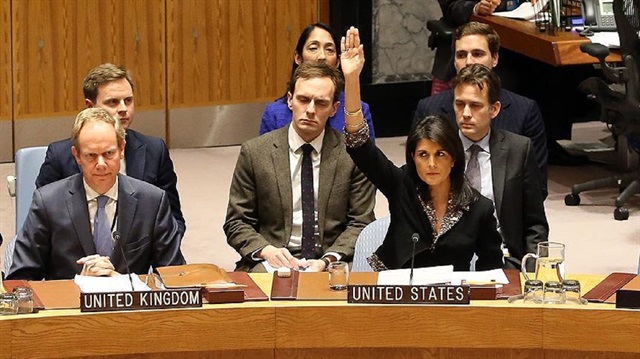
Washington outnumbered not only on Jerusalem move but also on Israel's occupation of Palestine and illegal settlements
Standing before the whole world, the U.S. has found only a handful of supporters at the United Nations, in votes before the Security Council and General Assembly opposing its much-criticized moves on Jerusalem and Palestine.
On Thursday, the full 193-member UN General Assembly will hold a rare emergency special session regarding President Donald Trump's Dec. 6 decision to recognize Jerusalem as Israel's capital and relocate Washington’s Embassy from Tel Aviv to Jerusalem.
On Monday, breaking with the rest of the council, the U.S. vetoed a UN Security Council resolution that rejected Trump’s decision.
Unlike at the Security Council, the U.S. has no veto power in the assembly.
However, this is not the first time that the U.S. administration has been left without allies in the international area on the issue of Israel and the Palestinians, according to information reviewed by Anadolu Agency.
The U.S. was outnumbered not only in its Jerusalem move but also in the issues of Israel's occupation of Palestinian territory and construction of illegal settlements in these territories.
Under Resolution 377A(V), "Uniting for peace," to date only 10 such sessions have been convened, the last in 2009, on "Illegal Israeli actions in Occupied East Jerusalem and the rest of the Occupied Palestinian Territory".
"The session followed a series of Security Council and General Assembly meetings regarding the Israeli decision to build Har Homa, a 6,500-unit housing project, in the Jabal Abu Ghneim area of East Jerusalem," according to the UN.
Thursday’s session will continue from the 2009 session.
In November 2009, the UN General Assembly voted 114-18 in favor of a resolution "giving Israel and the Palestinians three months to undertake 'independent, credible investigations' into serious violations of human rights committed during the conflict in Gaza that broke in late December 2008," according to the UN.
The U.S., Israel, and a few small island states were among the 18 states voting against the resolution.
In 2015, at the UN’s 70th General Assembly, 71 states voted against the U.S. in 18 draft resolutions on Palestine.
Both Canada and Israel supported the United States in all the draft resolutions.
France, Germany, the UK and the Czech Republic voted 12 times against the US, voted in favor of the U.S. once, and abstained from voting five times.
Washington has largely used its veto power in favor of the status quo of the Palestinian territories, currently under Israeli occupation, UN figures show.
Trump on Wednesday threatened to cut U.S. aid to countries that vote in favor of a UN resolution that denounces his decision to recognize Jerusalem as Israel's capital.
"They take hundreds of millions of dollars and even billions of dollars, and then they vote against us. Well, we’re watching those votes. Let them vote against us. We’ll save a lot. We don’t care,” Trump said at the White House.
"This isn't like it used to be where they could vote against you and then you pay them hundreds of millions of dollars and nobody knows what they're doing."
Trump's UN ambassador, Nikki Haley, foreshadowed the threat a day earlier, saying on Twitter "the US will be taking names" ahead of the vote Thursday, maintaining Washington has the right to choose the location of its embassy.
Citing an email, Foreign Policy magazine reported Tuesday that Haley warned the member states, saying President Trump would be "watching" the vote.
"As you consider your vote, I want you to know that the President and the U.S. take this vote personally.
"The President will be watching this vote carefully and has requested I report back on those countries who voted against us. We will take note of each and every vote on this issue," Haley wrote in the email, Foreign Policy said.
Jerusalem's status has long been considered a final status issue to be determined by Israeli-Palestinian peace negotiations and Trump's decision is widely seen as undercutting that long-standing understanding. East Jerusalem, which Palestinians are seeking to make the capital of their state, has been under Israeli occupation since 1967.


